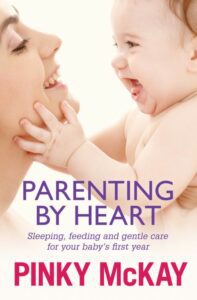
Top tips to help your baby (and you!) sleep better
By Pinky McKay, International Board Certified Lactation consultant, Infant Massage Instructor and author of “Sleeping Like a Baby” , ‘100 Ways to Calm the Crying’ and ‘Parenting by Heart’(Penguin).
Just like us, babies are individuals –and this goes for sleep requirements too. It may help (or not, if you are suffering from sleep deprivation) to realise that in most infant sleep studies, ‘all night’ is defined as five hours. If you are thinking that even five hours uninterrupted sleep would be a dream come true, there are some gentle strategies you can try to help your baby, and you, to sleep better.
1 Know the signs – None of us like being kept awake when we are craving sleep, so rather than waiting until your baby is ‘past it’, put her to bed as soon as she shows sleepy signs such as becoming quiet, yawning, making “jerky” movements, losing interest in people and toys, and fussing. If you miss this window of opportunity, your baby is likely to become grumpy and find it difficult to settle.
2 Introduce bedtime rituals – bedtime routines can become cues that help even tiny babies wind down and become conditioned to fall asleep. From the earliest days, give her a warm relaxation bath just before bedtime ( Tip- wrap and cuddle baby dry so she isn’t upset by her startle reflex).
3 A magic touch –Silent nights could be at your fingertips: Research from Miami University showed that infants and toddlers who were massaged daily for one month, for 15 minutes prior to bedtime, fell asleep more easily by the end of the study. To learn infant massage, see Pinky McKay’s Baby massage DVD
4 Soothing sounds – The calming, repetitive sounds of traditional lullabies recall the ‘womb music’ your baby heard before birth (your heartbeat, and fluids whooshing through the placenta). Baby music that incorporates elements such as the rhythm of the maternal heartbeat can have remarkable soothing effects, especially if played continuously through the night.
5 Rock a bye baby – The motion of a rocking chair or being carried in a sling will lull baby to sleep. So will a special-purpose baby hammock – and as baby moves and arouses during the night, her movements will start the hammock rocking.
6 All snuggled up –The startle reflex, a primitive survival reflex that produces spontaneous, jerky movements, even in sleep, can be disturbing (literally). Provide a sense of security by swaddling your newborn – wrapping him firmly in a gauze or muslin sheet (in summer) or a soft shawl in winter. Gradually wrap more loosely and discard the wrap as this reflex disappears (by around three months).
7 Cut caffeine – If you are breastfeeding, caffeine can create a vicious circle: You drink coffee (or tea or cola) to give you a hit, baby gets a boost of stimulant through your milk- and becomes restless. Newborns are particularly vulnerable to caffeine: A newborn may take up to ninety seven hours to get rid of caffeine so the effects will be accumulative.

9 Try a top up feed – Whatever time your baby was last fed, gently offer a feed just before you go to bed yourself (don’t wake him, he will suck in his sleep) and, with luck, his longer sleep may coincide with yours.
10 Teach her day from night Teach baby the difference between night and day by keeping the lights low and attending to him quietly during night feeds. Save play and chatter for daytime.
11 Do not disturb-Avoid waking baby during night feed times by changing the nappy either before or half way through a feed, not when baby is all ‘groggy’ and full. If baby is falling asleep during feeds, so only having a short feed, try changing the nappy half way through, then offering the other breast.
12 Let him suck up to the boss –Falling asleep on the breast is one of the easiest ways for most babies to settle. This is due to hormones released while your baby feeds but if you are concerned about it becoming a habit, alternate feeding with other sleep cues and take heart: he may still like to snuggle up to a breast when he’s twenty one – but it won’t be yours!
For breastfeeding advice or support contact the Australian Breastfeeding Association – www.breastfeeding.asn.au or a Board certified lactation consultant.
13 Share sleep – Research shows that mothers and babies who sleep together (within reach of each other, not necessarily in the same bed) share the same sleep cycles, so these mothers get more sleep overall. Remember SIDS risk reduction guidelines – maintain a smoke-free environment (don’t bed share if you are a smoker); put baby to sleep on his back; avoid overheating (use blankets rather than doonas); keep baby’s head uncovered and use a firm mattress (no waterbeds). Both parents should avoid alcohol and medications that reduce awareness of baby. (See the sleep articles and links at http://www.pinkymckay.com.au for a collection of Co-Sleeping links with articles by experts).
14 A little bit of mummy–it’s not exactly a substitute for you, but if you slip your own soft, unwashed tee-shirt over baby’s mattress, she will be comforted by your familiar smell as she sleeps.
15 Stop the Clock –Simply knowing how long you are awake can be enough to make you too tense to get back to sleep, or it may encourage you to rush your baby and make him feel anxious. If you see your baby’s waking as a genuine need, it could help you to enjoy this precious cuddle time: feel the softness of his skin, breathe in his delicious smell and snuggle!
If your baby is still awake — for more tips to help your baby (and you!) sleep, read Pinky’s best-selling book Sleeping Like a Baby.
Pinky McKay, International Board certified Lactation Consultant (IBCLC), runs a private practice in Melbourne specializing in gentle parenting techniques. A sought after keynote speaker and best-selling author with 4 titles published by Penguin, including her recent book Parenting By Heart, she’s an expert source for media appearing regularly on major network TV and quoted in various publications. Parenting resources and her free newsletter ‘Gentle Beginnings’ can be found on her website www.pinkymckay.com.au
